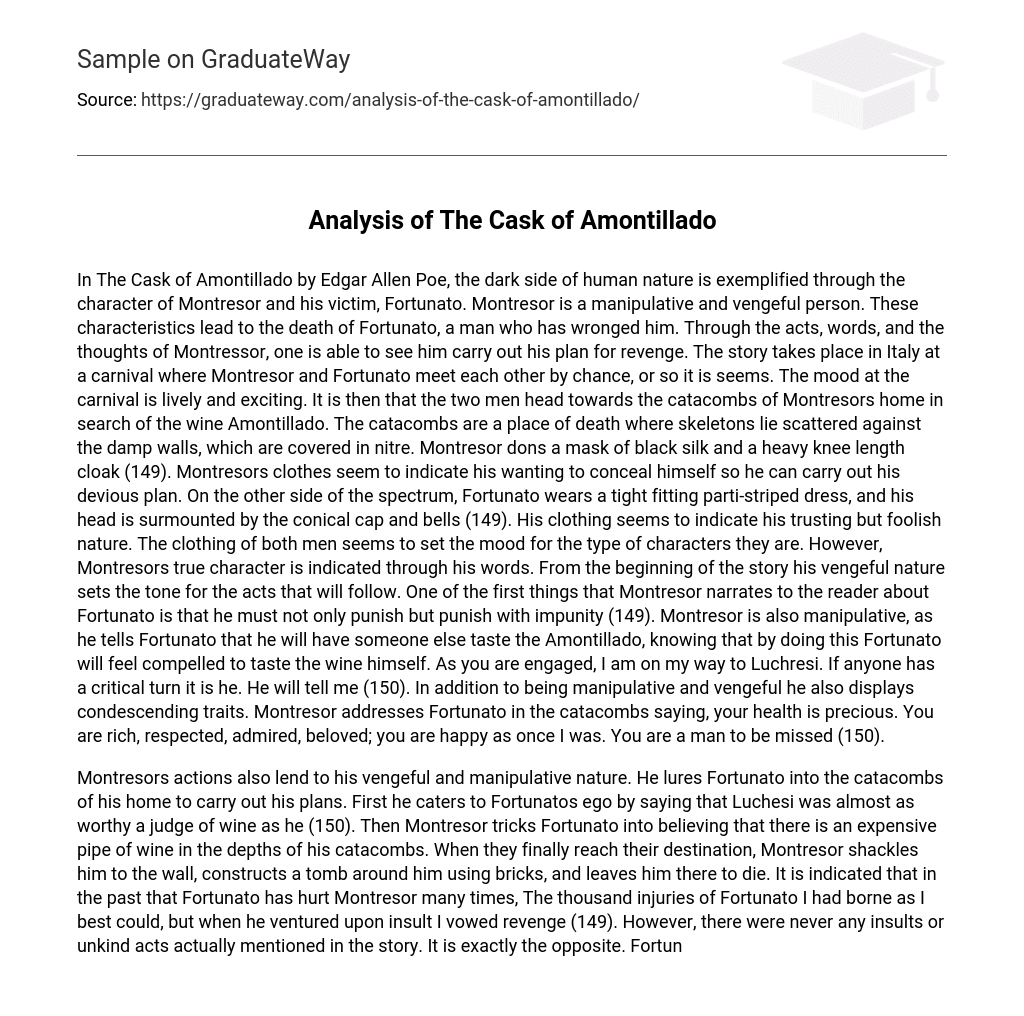In Edgar Allen Poe’s The Cask of Amontillado, Montresor and his victim, Fortunato, embody the dark side of human nature.
Montresor, a manipulative and vengeful person, is responsible for the death of Fortunato, who has wronged him. Montresor’s actions, words, and thoughts reveal his carefully executed plan for revenge. The story unfolds in Italy during a lively and exciting carnival, where Montresor and Fortunato coincidentally cross paths. They decide to venture into the catacombs of Montresor’s home in search of the wine Amontillado.
In the catacombs, skeletons are scattered against the damp walls, covered in nitre. Montresor disguises himself with a black silk mask and a knee-length cloak (149). By wearing these clothes, Montresor aims to hide his true intentions and execute his cunning plan. In contrast, Fortunato wears a tight parti-striped dress that fits him closely and tops his head with a conical cap adorned with bells (149). Fortunato’s attire suggests his naive and gullible nature.
The clothing worn by both men appears to reflect their personalities. However, it is Montresor’s true character that is revealed through his words. Right from the beginning of the story, his vengeful nature sets the tone for the actions that will unfold. Montresor explicitly states to the reader that he not only intends to punish Fortunato but wants to do so without facing any consequences (149). Furthermore, Montresor proves himself to be cunning by suggesting that someone else should taste the Amontillado, knowing full well that this would entice Fortunato into trying it himself.
As I am on my way to Luchresi, who has a critical turn, I am engaged. Luchresi will tell me (150). Montresor addresses Fortunato in the catacombs and displays condescending traits, in addition to being manipulative and vengeful, saying that his health is precious.
You possess wealth, esteem, admiration, and love; you experience happiness just as I did in the past. You are a person who would be greatly missed (150). Additionally, Montresor’s actions support his vengeful and deceitful character. He entices Fortunato to enter the catacombs of his residence in order to execute his schemes.
The story begins with Montresor stroking Fortunato’s ego by stating that Luchesi was almost as skilled in judging wine as he is (150). Subsequently, Montresor deceives Fortunato into believing that there is a valuable cask of wine hidden in the depths of his catacombs. Eventually, upon reaching their destination, Montresor fastens Fortunato to the wall, constructs a tomb using bricks, and abandons him there to perish. It is implied that Fortunato has inflicted numerous injuries upon Montresor in the past, “The thousand injuries of Fortunato I had borne as I best could, but when he ventured upon insult I vowed revenge” (149). Nevertheless, the story does not explicitly state any actual insults or unkind actions.
Contrary to what one might believe, Fortunato was actually kind and supportive towards Montresor. However, Montresor perceived Fortunato as someone who had harmed him right from the start. In the story, it is evident that Montresor had a specific grudge against Fortunato, despite acknowledging his qualities of being respectable and intimidating (149). This line emphasizes that Montresor had carefully planned his revenge.
There is no indication of Fortunato’s thoughts towards Montresor but it can be assumed that he trusts him as he follows him into the catacombs. It is not until the very last moment, right before the last brick is laid, that Fortunato realizes this is all a joke. Ha! Ha! Ha! he! He! He! a very good joke, indeed-an excellent jest (153).
Montresor achieves revenge successfully by luring Fortunato into the catacombs and effortlessly trapping him against a wall, securing him with shackles. Subsequently, Montresor proceeds to build a tomb of bricks around Fortunato, layer by layer. When Montresor calls out to Fortunato, there is no response, affirming the success of his plan. In pace requiescat! (153). The concluding lines undeniably depict Montresor’s triumphant execution of his plan.
Montresor’s vengeful nature led him to manipulate Fortunato, ultimately causing his demise. Throughout the story, Montresor’s sole focus was avenging the perceived insults he had received. Despite committing a heinous act, he never revealed his true dark side, successfully taking someone’s life without remorse.





